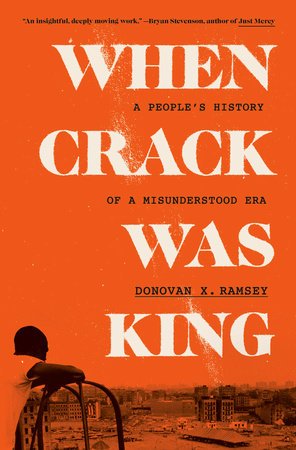I’d wanted someone to write this book for a long time.
I’m lucky enough to have grown up in a neighbourhood more or less untouched by the crack epidemic, but I was alive during its peak, too young to understand exactly what crack was or what it did, but old enough to catch the wave of fear and disdain that emanated from its use. Mostly this filtered through hyperbolic news coverage and sappy TV plotlines, but it entered general discourse too. Kids used crackhead as a slur for a poor or mentally unwell person, and I knew a “crack baby” was a child born broken in some fundamental way. But I never understood why crack emerged so abruptly, ravaged communities so thoroughly, and why it seemed to ebb away even as I became aware of it.
Donovan X. Ramsey does a great job answering these questions, and a lot more besides. When Crack Was King takes a broad lens to the crack epidemic, reaching back to the Great Migration and Nixon’s War on Drugs to explain how the impoverished, largely Black population of America’s inner cities became uniquely vulnerable to the drug, documents the rise in cocaine’s availability that dropped the price enough for regular people to afford it, and the chemical innovations that freed cocaine from its powdered form, first through the complex and dangerous method of free base, and later through the much simpler form of crack. Ramsey meticulously discusses the policy decisions of each administration, how each party’s desire to be “touch of crime” led to an ever-tightening spiral of restrictions and harsher sentences. He also gives a simple and compelling reason for why crack petered out the way it did: its addiction was so ravaging and destructive that the kids growing up around the first generation of addicts were scared off for fear of becoming the second.
As good as Ramsey is at the wide lens, When Crack Was King is at it’s core a book about four people whose lives were touched by the crack epidemic: Elgin Swift, the son of an addict who grew up in a Yonkers neighbourhood ravaged by crack; Lennie Woodley, an addict herself who overcame an appallingly abusive childhood and years as a sex worker to become an advocate for addicts in recovery; Kurt Schmoke, the mayor of Baltimore, who fought the Tough on Crime tide in an effort to put compassion and treatment into the city’s response to the epidemic; and Shawn McCray, a basketball prodigy and ace student who sold crack and became part of an infamous Newark gang called the Zoo Crew. Ramsey’s portraits of the four are unfailingly sympathetic yet honest, not flinching from the failures and bad decisions they sometimes made—that we all make, and that those more fortunate among us can afford to make without serious consequences.
Ramsey’s prose is engaging and evocative without being flowery. He captures the mood of a troubled era in American history in an illuminating way. This book was excellent.








